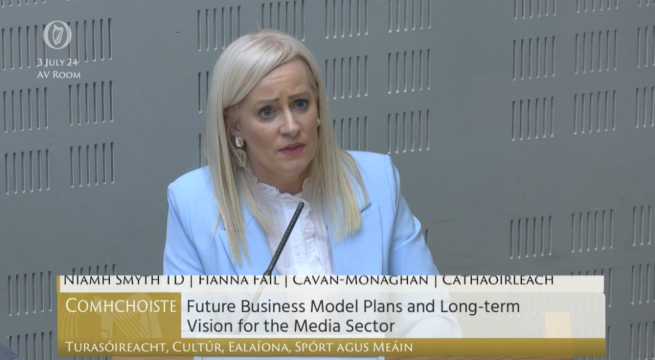The TV licence fee system to fund RTÉ should be abolished and replaced with direct funding from the Exchequer, a media committee report has recommended.
There was a significant split among its members over this decision, with the committee’s chair and other government members voting against abolishing the TV licence fee.
Chairwoman of the committee Niamh Smyth said that there had been “divergent views” among TDs and Senators on the committee about the methods of funding the broadcaster, while Fine Gael TD Ciaran Cannon said getting rid of the fee would be “unwise”.
Ms Smyth said: “The committee’s headline recommendation in this report is the abolition of the TV licence, a topic which has been much debated at committee, with divergent views, however… we now bring a recommendation of the majority in this regard.
“It is the committee’s agreed recommendation instead foresees Exchequer funding managed by Coimisiun na Mean.
“The committee recommends multiannual funding to public service media entities on the basis of corresponding multiannual strategies on performance commitments.”
The committee also recommended that RTÉ keep the “dual-funding model”, based on State funding and advertising, which should be “subject to appropriate transparencies”.
Asked about a division on the committee about the funding model, and whether the report’s recommendation reflected the committee’s view, several members present for the launch of the report said they believed the TV licence fee model should be kept.
“I think people should be paid something for their TV,” Fine Gael TD Michael Ring said.
Mr Cannon said: “I would support the retention of a TV licence in some shape or form. I think it’s exceptionally important that people have a sense of ownership of public service broadcasting.”
Mr Cannon continued: “There was division and ultimately that’s reflective of the Oireachtas as a whole right now, and ultimately it is up to the people in Cabinet to decide what direction to take, but there’s an awful lot of consensus emerging around the protection of public service, of regional production and regional contribution to public service broadcasting.”
Ms Smyth said that if there was a positive from the fallout from the RTÉ controversy that arose last summer, it was that it out a focus on making public service broadcasting sustainable, and noted a Reuters report that indicated trust in RTÉ had increased by a percentage point in the past year.
She said the country’s media should reflect its people and interests, and said the committee recommended a public code so there is equal access to the Irish media.
The committee wants greater broadcasting of arts and culture events, and the diversification of sports broadcasting.
It also called for “ambitious” targets for the Irish language and for parity of pay for staff at Raidio na Gaeltachta, in line with their other RTE colleagues.
Media Minister Catherine Martin was asked by the committee to consider the recommendations made in the report.
Fianna Fáil Senator Malcolm Byrne said that the media landscape had changed dramatically from the days where “everyone gathering around a TV set on a Sunday evening to watch Glenroe”.
“What we want at the end of all this process and what we want to ensure is that we have quality Irish content being created, that we have Irish voices heard both here and abroad, and Irish stories being told.”
“On the core question about how we fund public service broadcasting generally, the decision on the TV licence fee, we do view the licence fee as an anachronistic fee that dates back to a different era.”
He said to fund RTÉ’s digital strategy a new model was needed that would work in a digital age, and that this would mean direct Exchequer funding.
Senator Fintan Warfield urged the minister to publish research into implementing a content levy which he said could being in €25 million a year for productions in Ireland.
“I personally think big tech need to pay their fare share… and a content levy is one way where we could support Irish productions,” he said.
Sinn Féin TD Imelda Munster said that there was a split between the Fianna Fáil members on the committee on whether to switch from a TV licence fee system to direct funding from the government of the day.
“They’re still not grabbing the bull by the horns and making that decision,” she said of the government.
“Given all of the reports, and the minister’s own recommendations that this happen, you’d wonder if the minister is being blocked from implementing her preferred option.
“You’d have to ask the question what’s the point of having a minister for media if the other government parties are going to go against every recommendation that has been made towards that?”
Mr Ring said he could not understand why media organisations made online articles available to read for free, while Tipperary TD Mattie McGrath raised issues with matches on GAAGo.
NUJ assistant general secretary Seamus Dooley called the report “good” and “courageous”, and said it was “never right” that Irish language journalists were paid differently to English language journalists.







